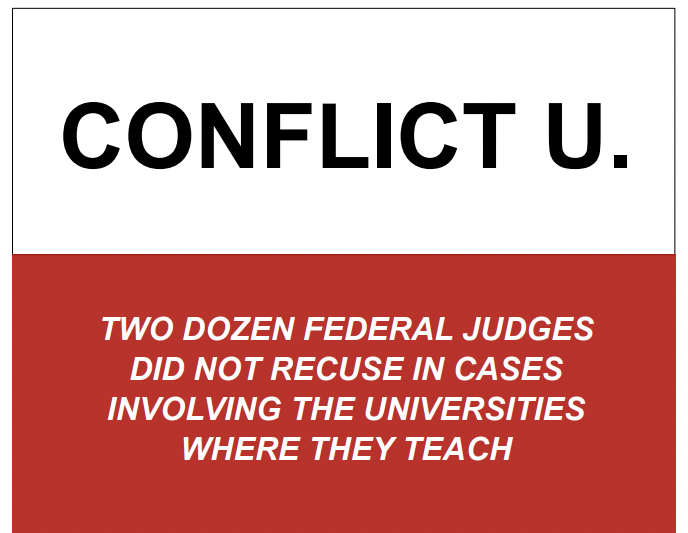Update to "Conflict U.": Some Judges Are Recusing Due to a University Conflict
By Manny Marotta, FTC law clerk

In July, Fix the Court released a report called “Conflict U.” that identified 24 federal judges who did not recuse in six dozen cases involving the universities where they also serve as law school instructors.
This practice raises clear conflict-of-interest concerns, despite being sanctioned by judiciary policy.
The report urges reforms to strengthen recusal practices and restore public trust in judicial ethics.
This past month, Fix the Court conducted follow-up research on this issue, and what we found was somewhat surprising: several judges with adjunct positions at law schools are, in fact, choosing to recuse when the law schools’ parent universities find themselves in their courtrooms. And at least one judge (we have another in mind but are double-checking) is recusing due a spousal connection to a university. N.B.: the Buescher and Koeltl examples were included in “Conflict U.,” though the others were not.
2025
1. In June, D. Neb. Judge Brian Buescher recused in Mohammed v. Creighton University (filed 12/9/24; last filing 6/3/25; recusal order entered 6/2/25) likely because he serves as an instructor at Creighton University School of Law.
2. In May, N.D. Ga. Magistrate Judge Anna Howard recused in Manuel v. Georgia State University (filed 5/5/25; last filing 6/16/25; recusal order entered 5/6/25). According to her LinkedIn profile (she’s a 2025 appointee, and her initial financial disclosure isn’t yet posted in the online database), Howard teaches at the University of Georgia School of Law, which, alongside Georgia State, is part of the University System of Georgia.
3. In April, D. Mass. Judge William G. Young recused in Curtin-Wilding v. Trustees of Boston University (filed 2/21/25, last filing 8/27/25; recusal order entered 4/29/25). We believe the recusal occurred due to Young’s prior teaching at BU Law, from 1979 to 2020, which is mentioned in the defendant’s motion for recusal.
4. In April, S.D.N.Y. Judge John Koeltl recused in Thomas v. New York University (filed 3/26/25; last filing 6/20/25; recusal order entered 4/1/25 [text-only in the docket]) likely because he serves as an adjunct at NYU School of Law.
2024
5. Last December, N.D. Fla. Judge Hope Cannon recused in Robinson v. University of West Florida (filed 12/6/24; last filing 12/9/24; recusal order entered 12/9/24), possibly because she’s an adjunct professor of criminology at UWF — at least according to this UWF webpage, though that affiliation appears on none of her financial disclosure reports. (We’ll follow up with her chambers on that.)
6. Last October, S.D. Fla. Magistrate Judge Jonathan Goodman recused in Comack v. University of Miami (filed 9/6/24; last filing 6/20/25; recusal order entered 10/7/24). The plaintiff’s motion stated that the recusal request was filed due to Goodman being a University of Miami School of Law alumnus, but the judge also teaches at Miami Law, which he specifically mentioned in his recusal order (“I am also an adjunct instructor at the University of Miami law school, in its litigation skills program. Therefore, the Undersigned, to whom matters and motions in the above-styled case have been referred, recuses himself…”). Goodman retired from the bench this past July.
7. Last April, W.D. Okla. Judge Scott Palk recused in Olupitan v. Board of Regents at the University of Oklahoma (filed 4/8/24, last filing 8/15/25; recusal order entered 4/9/24), likely because his wife is deputy general counsel at the University of Oklahoma.
We’ll keep looking into this and in the meantime hope that the committee, as well as the public, will recognize that while some judges are committed to avoiding conflicts of interest, others are not — and that reform is necessary to ensure consistency across the judiciary.